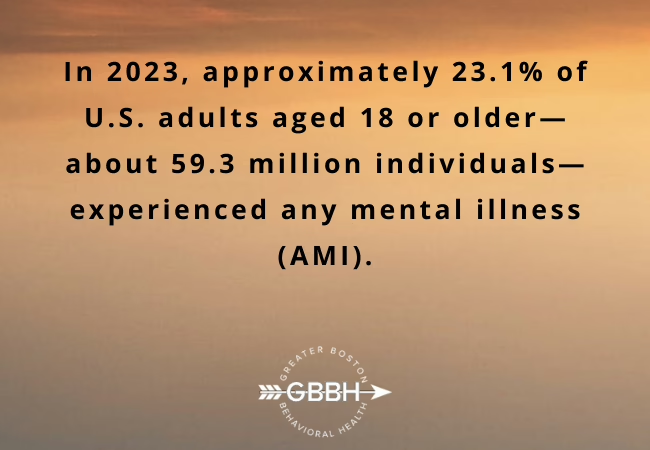Mental health is an essential pillar of overall well-being, yet it often goes overlooked in the hustle and bustle of daily life. When mental health struggles like anxiety, depression, trauma, and emotional dysregulation arise, they can profoundly impact every aspect of a person’s life. From interpersonal relationships to career performance, the effects of untreated mental health conditions can be debilitating.
Fortunately, mental health programs offer structured support and therapeutic interventions designed to address these issues effectively. Whether you are experiencing anxiety, emotional turmoil, trauma, or co-occurring disorders, mental health programs provide the care and resources needed to regain emotional balance, stability, and well-being.
At Greater Boston Behavioral Health, our Mental Health Programs Boston offer a comprehensive range of treatments that help individuals manage stress, regulate emotions, and develop healthier coping mechanisms. Whether you’re dealing with the challenges of anxiety, depression, anger, or trauma, our programs are tailored to meet your specific needs and support you on your journey to mental wellness.
In this article, we’ll explore what mental health programs are, how they work, and why they are essential for individuals struggling with emotional regulation and mental health challenges. We’ll also highlight how programs like Intensive Outpatient Program Boston (IOP), Partial Hospitalization Program Boston (PHP), and specialized therapies can offer transformative care.
What Are Mental Health Programs?
A mental health program refers to structured therapeutic interventions that help individuals manage mental health conditions through various treatment modalities. These programs are designed to provide a safe and supportive environment for individuals to address the root causes of their emotional struggles and learn healthy coping skills.
Mental health programs are typically led by licensed professionals, including psychiatrists, psychologists, licensed therapists, and social workers. They can vary in intensity and format, but all are geared toward providing the tools needed to help individuals regain emotional stability and mental clarity.
Types of Mental Health Programs
There are several types of mental health programs, each serving a different purpose depending on the severity of symptoms, the client’s needs, and the desired outcomes. At Greater Boston Behavioral Health, we offer a wide range of options to ensure that each client receives the appropriate level of care.
- Outpatient Therapy: This includes one-on-one therapy with a licensed professional on a weekly or biweekly basis, addressing various mental health concerns, including anxiety, depression, and stress management.
- Intensive Outpatient Programs (IOP): These are structured programs that involve therapy multiple times per week (3–5 days), with sessions typically lasting 3–4 hours per day. IOP is ideal for individuals who need more intensive support than traditional outpatient therapy but do not require 24/7 care.
- Partial Hospitalization Programs (PHP): PHP provides more intensive care for individuals who need full-day treatment (5–6 hours per day, 5 days a week). This level of care is suitable for those experiencing more severe symptoms but who do not require inpatient care.
- Residential Treatment Programs: These programs provide 24/7 care in a residential setting and are designed for individuals with more severe mental health issues that cannot be managed on an outpatient basis.
How Do Mental Health Programs Work?
Mental health programs work by offering a structured environment where individuals receive the care and resources they need to manage mental health symptoms and work toward recovery. The treatment is individualized, focusing on the root causes of the client’s emotional struggles and providing them with strategies to regulate emotions, cope with stress, and improve overall well-being.
Step 1: Comprehensive Assessment
The first step in any mental health program is a thorough assessment. During the initial evaluation, clients meet with a licensed therapist or psychiatrist who assesses their mental health status, personal history, and specific needs. This assessment helps in creating a personalized treatment plan that will address the client’s unique challenges, goals, and symptoms.
Step 2: Therapeutic Interventions
Once the treatment plan is developed, clients begin engaging in evidence-based therapeutic interventions. These interventions include:
- Cognitive Behavioral Therapy (CBT): CBT focuses on identifying and challenging negative thought patterns that contribute to mental health issues like anxiety and depression. It teaches clients to replace unhelpful thinking with healthier, more adaptive thoughts.
- Dialectical Behavior Therapy (DBT): Particularly effective for individuals who struggle with emotional regulation and mood swings, DBT helps clients develop skills for managing extreme emotions, improving relationships, and tolerating distress.
- Mindfulness-Based Therapy: Mindfulness techniques help clients stay grounded in the present moment and regulate overwhelming emotions. These practices help reduce the physiological impact of stress and anxiety.
- Trauma-Focused Therapy: For individuals dealing with trauma and PTSD, trauma-informed therapies, such as Trauma-Focused CBT, help clients process and heal from traumatic experiences in a safe and supportive environment.
Step 3: Medication Management
For many individuals, medication is an important part of managing symptoms related to anxiety, depression, or other mental health conditions. At Greater Boston Behavioral Health, we offer psychiatric evaluations and medication management as part of our Mental Health Programs Boston to ensure that clients receive the most comprehensive care possible. Medications may be prescribed to help manage symptoms such as insomnia, irritability, panic attacks, or mood instability.
Step 4: Group Therapy and Support
Group therapy offers the opportunity to connect with others who are experiencing similar challenges. It allows individuals to share their stories, gain support from peers, and practice new coping strategies in a safe environment. Group therapy is an essential component of programs like IOP and PHP, where clients can build interpersonal skills and reduce isolation.
Step 5: Continued Monitoring and Adjustment
As clients progress through treatment, their needs may change. The treatment team regularly monitors their progress and adjusts the treatment plan as needed. This ongoing support ensures that individuals continue to make progress and receive the right level of care throughout their recovery journey.
Types of Mental Health Programs at Greater Boston Behavioral Health
At Greater Boston Behavioral Health, we offer a comprehensive range of mental health programs designed to meet the needs of individuals struggling with anxiety, depression, trauma, anger management, and emotional regulation.
1. Anxiety Treatment Program Boston
Our Anxiety Treatment Program Boston is designed for individuals dealing with excessive worry, panic attacks, or generalized anxiety disorder (GAD). Through CBT, mindfulness, and exposure therapy, we help clients manage anxiety symptoms and regain a sense of control over their thoughts and emotions.
2. Depression Treatment Program Boston
Our Depression Treatment Program Boston helps individuals who are struggling with feelings of hopelessness, low energy, and sadness. We combine CBT, DBT, and medication management to provide holistic care that targets both the psychological and biological aspects of depression.
3. Intensive Outpatient Program (IOP) Boston
Our Intensive Outpatient Program Boston (IOP) is perfect for individuals who need more support than traditional therapy but can still manage daily responsibilities. IOP includes individual therapy, group therapy, and psychiatric support to help clients cope with symptoms of stress, anxiety, depression, and trauma.
4. Partial Hospitalization Program (PHP) Boston
For individuals experiencing more severe symptoms, the Partial Hospitalization Program Boston offers full-day, intensive care in a supportive environment. This program provides therapy and psychiatric support for clients who require more structured care than IOP but don’t need 24-hour hospitalization.
5. Anger Management Therapy Boston
Our Anger Management Therapy Boston program is designed to help individuals who struggle with emotional outbursts, irritability, or rage. Through DBT, CBT, and skills-building groups, we teach clients how to manage their emotions and respond to stressors in healthier ways.
6. Trauma Therapy Program in Boston
For individuals dealing with Post-Traumatic Stress Disorder (PTSD) or complex trauma, our Trauma Therapy Program in Boston provides specialized treatment, including trauma-focused CBT, EMDR, and narrative therapy to help individuals process and heal from traumatic experiences.
Why Choose Greater Boston Behavioral Health?
At Greater Boston Behavioral Health, we provide:
- Personalized treatment plans that are tailored to each client’s needs
- Evidence-based therapies that effectively treat anxiety, depression, trauma, and emotional dysregulation
- Comprehensive care, including therapy, medication management, and group support
- A compassionate and safe environment where clients can heal at their own pace
Conclusion
Mental health programs are a vital resource for anyone struggling with the challenges of anxiety, depression, trauma, and emotional regulation. These programs provide the structure, support, and professional care needed to regain balance, develop healthy coping strategies, and improve overall well-being. Whether you’re seeking help for the first time or continuing your journey to recovery, the right mental health program can empower you to take control of your emotional and psychological health.
At Greater Boston Behavioral Health, we offer a comprehensive range of Mental Health Programs Boston, tailored to your unique needs. Our Intensive Outpatient Program Boston, Partial Hospitalization Program Boston, and specialized therapies, like Trauma Therapy and Anger Management Therapy Boston, provide the care and tools necessary to help you thrive. Don’t wait for stress or emotional challenges to take over. Call Greater Boston Behavioral Health at 888.278.0716 today and take the first step toward lasting mental wellness.
Frequently Asked Questions (FAQ)
What are mental health programs?
Mental health programs are structured, therapeutic services designed to help individuals manage mental health conditions like anxiety, depression, and trauma. They provide various levels of care, from outpatient therapy to intensive programs like IOP and PHP.
How do mental health programs work?
Mental health programs work by offering therapeutic interventions like CBT, DBT, and trauma-focused therapies. Clients undergo a comprehensive assessment, followed by personalized treatment plans, which include individual therapy, group sessions, and psychiatric support.
What is the difference between Intensive Outpatient Programs (IOP) and Partial Hospitalization Programs (PHP)?
IOP offers structured care 3–5 days a week for a few hours each day and is suitable for clients who need more support than weekly therapy. PHP, on the other hand, provides full-day care for individuals with more severe symptoms and typically involves 5 days of therapy per week.
Who can benefit from mental health programs?
Anyone struggling with mental health conditions like anxiety, depression, anger, trauma, or emotional dysregulation can benefit from mental health programs. These programs are particularly useful for individuals who need structured support but do not require inpatient care.
How long do mental health programs last?
The duration of a mental health program varies depending on the individual’s needs. Outpatient therapy may last for several weeks to months, while IOP can last 6–12 weeks. PHP typically lasts 1–2 weeks for those with acute symptoms, but duration depends on individual progress.
togel slot
slot gacor 4d
togel online terpercaya
toto slot
toto slot
agen judi bola
toto togel
toto slot
daftar totoagung
togel slot
slot gacor 4d
slot gacor 4d
login slot gacor
slot qris
link gacor
slot gacor
slot qris
togel slot
link gacor
toto slot
idn toto
restoslot4d
pay4d panel
slot qris terbaru
slot gacor maxwin
toto slot
slot gacor olympus
idn slot
slot gampang menang
bandar togel terpercaya
amintoto
angka akurat
slot gacor 4d
toto slot
slot gacor 4d


